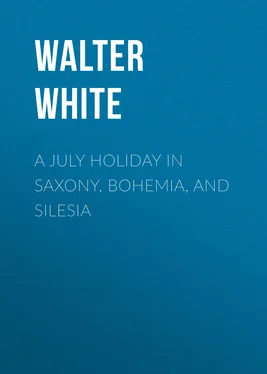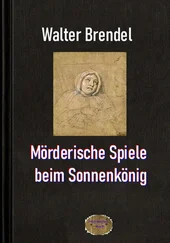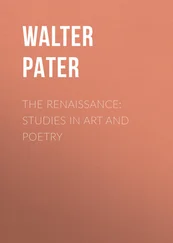Walter White - A July Holiday in Saxony, Bohemia, and Silesia
Здесь есть возможность читать онлайн «Walter White - A July Holiday in Saxony, Bohemia, and Silesia» — ознакомительный отрывок электронной книги совершенно бесплатно, а после прочтения отрывка купить полную версию. В некоторых случаях можно слушать аудио, скачать через торрент в формате fb2 и присутствует краткое содержание. Жанр: Путешествия и география, foreign_antique, на английском языке. Описание произведения, (предисловие) а так же отзывы посетителей доступны на портале библиотеки ЛибКат.
- Название:A July Holiday in Saxony, Bohemia, and Silesia
- Автор:
- Жанр:
- Год:неизвестен
- ISBN:нет данных
- Рейтинг книги:5 / 5. Голосов: 1
-
Избранное:Добавить в избранное
- Отзывы:
-
Ваша оценка:
- 100
- 1
- 2
- 3
- 4
- 5
A July Holiday in Saxony, Bohemia, and Silesia: краткое содержание, описание и аннотация
Предлагаем к чтению аннотацию, описание, краткое содержание или предисловие (зависит от того, что написал сам автор книги «A July Holiday in Saxony, Bohemia, and Silesia»). Если вы не нашли необходимую информацию о книге — напишите в комментариях, мы постараемся отыскать её.
A July Holiday in Saxony, Bohemia, and Silesia — читать онлайн ознакомительный отрывок
Ниже представлен текст книги, разбитый по страницам. Система сохранения места последней прочитанной страницы, позволяет с удобством читать онлайн бесплатно книгу «A July Holiday in Saxony, Bohemia, and Silesia», без необходимости каждый раз заново искать на чём Вы остановились. Поставьте закладку, и сможете в любой момент перейти на страницу, на которой закончили чтение.
Интервал:
Закладка:
As we strolled about the premises, the Braumeister called my attention to a writing over the main entrance—
Dulcius ex ipso fonte bibuntur aquæ,
remarking that he had never known a visitor disposed to quarrel with it. Then, abandoning his laconic phrases, he told me how the four hundredth anniversary of the Prinzenraub had been celebrated on the 8th of July, 1855. It was a day to be remembered in all the places made historic by the event. From Schedewitz, on the farther side of Zwickau, a long procession had walked to the Brewery, under triumphal arches erected on the way. First came a troop of Coalers, in forest garb, then friends of the company on foot and in wagons, and bands of music; altogether eight hundred persons, and among them the three Trillers . Airs were played and songs sung that made all the fire of patriotism glow again; and so earnestly did the multitude enter into the spirit of the celebration, that—a merry twinkle gleamed in the Braumeister's eye as he told it—"They drank a hundred eimers of beer. There they are: look at them," he added, pointing to an engraving of the whole procession—the Trillerzug , as he called it.
A similar festival was held at Altenburg, Hartenstein, and Grünhain on the same day, to the entire satisfaction of all concerned, and the reinvigoration of Saxon loyalty.
I was seated at one of the tables with a tankard of beer before me, when a young man came up, looked at me inquisitively, and said, "E shmall Eng-lish speak"—meaning, "I speak a little English."
I felicitated him on his acquirements, when he proceeded to tell me that he was one of the clerks employed in the counting-house, and having heard of my arrival from the Braumeister , could not resist the desire of speaking with an Englishman. Moreover, he would like to show me certain things which I had not yet seen, and he said, "If you pleasure in Prinzenraub find, so is glad to me."
We were friends in a moment. He led me first to the counting-house, and showed me the bust of Herr Ebert, who, as chief proprietor, had headed the procession in the former year, but was since deceased, saying, "We very, very sorry; every man love him. Ah! he was so good." Then running up-stairs to a large whitewashed apartment—one of the drinking-rooms used when guests are driven in-doors by bad weather—where a few portraits hung on the walls, he cried, "Here is something to see. But wait—you will have a tsigger?"
"With pleasure," I answered, "if it's good to drink."
"No, not drink," he replied. "What you call him?—to shmoke."
The room echoed with my laugh, and he prolonged it, as I rejoined, "Oh! you mean a cigar! No, thank you. Tobacco is one of the things I abhor."
"What you call him?" he exclaimed, in amazement—"cigar! Then what for a teacher is mine. But he is a German."
Our friendly relations were in no way deranged by my dislike of a "tsigger;" and we turned to the portraits, which comprised some of the personages involved in the Prinzenraub . The brave old Triller is represented in the costume of the period—a stalwart fellow, with ample black beard, bare legs, broad-brimmed hat, and loose frock tied by a belt round the waist. In one hand he grasps his pole, with the other supports the prince, who wearing red hosen and peaked red boots, looks up to him with tearful eye. Kunz appears lying down in the background, looking half-stunned and miserable. There are two miniatures—of the Triller and his wife—apparently very old, believed to be likenesses. In the excitement occasioned by the four hundredth anniversary, a poor shoemaker, hearing it talked of, came to the brewery with the paintings in his hand, and sold the two for a shilling. Besides these there are seven or eight other portraits, among which the features of Kunz impress you favourably. He has dark curly hair, a high forehead, a clear bright eye, moustache and pointed beard; the whole appearance and expression reminding you of Sir Philip Sidney.
What with fluent German and broken English the young clerk worked himself into enthusiasm, and showed me everything that had the remotest connexion with the subject, ending with a book containing the latest history of the Prinzenraub , and engravings of its incidents. Nor could he think of letting me depart till I had seen the whole premises, and the enormous cellars.
"The Triller is a good name for the brewery," he said, as we paced between the furlongs of barrels.
On my return to the town I found out the ancient dame who keeps the key of the church tower, and as she unlocked the door offered her a small silver coin. "No! no! no!" she exclaimed, "that is too much. A Dreier (halfpenny) is enough for me." A rare instance of disinterestedness. Once admitted, you find your way alone up to the topmost chamber, where dwells a woman with two or three children. She was winding up from the street below her daily supply of water when I entered out of breath with the ascent of so many steps, and paused in her task to conduct me to the platform, a height of about two hundred feet, from which the steeple springs one hundred and fifty feet higher. Wide and remarkable is the prospect: the rows of poplars which border the roads leading on all sides from the town divide the landscape into segments with stiff lines that produce a singular effect as they diminish gradually in thickness and vanish in the distance. Plenty of wood all around, merging towards the south into the vast fir forest which there darkens the long swells and rounded summits of the Erzgebirge : a region of contrasts, with its abounding fertility and unpicturesque foundries and mining-works. The town appears to better advantage from above than below, for the many green spots in the rear of the houses come into the view, and you see gleaming curves of the Mulde, and a great pond as at Altenburg, and the remains of the old walls, and the ditches, now in part changed into a garden promenade.
The mind becomes interested as well as the eye. You may grow dreamy over the fabulous adventures of the fair Princess Schwanhildis, in whose adventures, as implied in hoary tradition, the place originated; and if you desire proof, is it not found in the three swans, still borne in the town arms? Or you may revert to the sixth century only, when the Wends had a colony here, and worshipped Zwicz, one of their Sclavish fire-gods in the Aue , or meadow—whence the present name, Zwickau. Or you may remember that Luther often mounted the tower to gaze on the widespread view; and imagine him contemplating the scenes on which your eye now rests—a brief pause in his mighty work of rescuing Europe from the toils of priestcraft. A clumsy table yet remaining on the platform, though tottering and fallen on one side with age and weakness, is called "Luther's table;" the great Reformer having, as is said, once sat by it to eat. But the sentiment which such a relic should inspire is weakened by the inference that as the Zwickauers take no pains to preserve it from the weather, they at least are sceptical concerning its merits.
And the church itself. It is the largest, the finest specimen of Gothic, and has the biggest bell, in all Saxony, and excepting two towers in Dresden, is the highest. It dates from the eleventh century, and has been more than once restored. The interior well repays a visit. The slender, eight-sided pillars of the nave, the rare carvings of the bench-ends, and others about the choir and confessional, and in the sacristy, the high altar, by Wohlgemuth, of Nuremberg, the only one remaining of twenty-five which formerly stood around the walls, raise your admiration of art. If curious in such matters, you may see a splinter of the true cross—a relic from Popish times—still preserved. There are some good paintings, of which one by Lucas Cranach the Younger represents Jesus as "Children's Friend." It was painted at the cost of a burgomaster in honour of his wife's memory.
Читать дальшеИнтервал:
Закладка:
Похожие книги на «A July Holiday in Saxony, Bohemia, and Silesia»
Представляем Вашему вниманию похожие книги на «A July Holiday in Saxony, Bohemia, and Silesia» списком для выбора. Мы отобрали схожую по названию и смыслу литературу в надежде предоставить читателям больше вариантов отыскать новые, интересные, ещё непрочитанные произведения.
Обсуждение, отзывы о книге «A July Holiday in Saxony, Bohemia, and Silesia» и просто собственные мнения читателей. Оставьте ваши комментарии, напишите, что Вы думаете о произведении, его смысле или главных героях. Укажите что конкретно понравилось, а что нет, и почему Вы так считаете.












